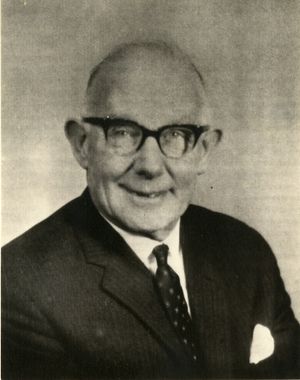Harold M. Barlow
- Birthdate
- 1899/11/15
- Birthplace
- London, England
- Awards
- IEEE Mervin J. Kelly Award
Biography
Among the many scientific advances of recent times, none has made a more obvious impact on our daily lives than the developments in telecommunications that have brought the world into our very homes, given us contact over great distances, and increased the safety of travel. Harold Barlow has been concerned throughout his career with the study and development of telecommunications and, in particular, with the use of microwaves.
Mr. Barlow was born in London, England, November 15, 1899. Originally a student at University College, London, where he received his B.Sc. (Eng.) and Ph.D. degrees, he joined the Department of Electrical Engineering there as a lecturer in 1927, rising to become, after war service from 1939 to 1945, Pender Professor of Electrical Engineering in the University of London. He held this appointment until his retirement in 1967, when he was granted the title of Emeritus Professor. During World War II, he was engaged in radar and radio development, and it was this war-time experience, first at the Telecommunications Research Establishment and later at the Royal Aircraft Establishment, that led him to see that improved communication facilities by radio and telephone could be met exploiting the microwave region of the electromagnetic spectrum. On his return to University College in 1945, he applied himself to the problems involved in guided-wave propagation, concentrating in particular on the development of the circular metallic waveguide propagating the TE01 mode. He also did pioneering work on guided surface waves and made significant innovations in the techniques of power measurements. Professor Barlow, and his students, also have made important contributions to the understanding of signal distortion along a circular guide, to techniques to minimize it, to methods of launching the TE01 mode in pure form, and to ways of filtering off the desired frequency channels.
Harold Barlow was elected a Fellow of the Royal Society in 1961 and has received many other professional honors, both national and international. These include the Kelvin, Thomson, Oliver Lodge, and Fleming Premiums of the Institution of Electrical Engineers, the Faraday Medal, the U.R.S.I. Dellinger Gold Medal, an Honorary Fellowship of the Institution of Electronic and Radio Engineers, and an Honorary Degree of Doctor of Engineering from the University of Sheffield. He is a foreign member of the Polish Academy of Science. He has some notable publications to his credit, including a book on microwaves and waveguides, two other books of which he is a joint author, and over 100 research papers. He has served on Government and BBC Advisory Boards, the Council of the IEE, and many other important committees.
Though a most distinguished engineer, with an unceasing and stimulating flow of ideas, he is a very practical man, well able to devise, in his own workshop for instance, research equipment that technical experts averred could not possibly be made. Above all, he is a humane man who has always taken a personal interest in his students even if, as some have complained, his zeal for his subject makes him unmindful of mealtimes when engaged in discussion. His research interests continue in his retirement, though broadened to include the assessment of the response of people to technological innovation, together with the unraveling of mysteries in detective stories-which he likens to the search for new scientific information.
